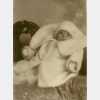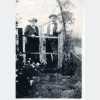| Profile | Posted by | Options | Post Date |

|
James
|
Report
|
27 Dec 2012 14:39 |
|
Any ideas why an ancestor,Richard Waters,a widower,should have died in the workhouse in 1877 of senile decay aged 89 when he had five grown-up children all in steady jobs(quarryman,tailor,farm labourer,mason's wife,maltster), with settled families of their own?
The whole family group always lived in neighbouring cottages: two sons and a daughter were actually nextdoor to him and his wife in 1871 while two more sons were within 300 yds.
I can't imagine that all five offspring would have washed their hands of him after his wife died.
Given his grand age,would dementia possibly be a reason for his "incarceration"?
Another odd aspect of his death cert. is that the informant appears to be a fellow inmate!
JRG
|

|
brummiejan
|
Report
|
27 Dec 2012 14:55 |
|
Well, one thing to bear in mind is that workhouses often functioned as hospitals also - in fact, some old hospitals still around today were workhouses at some point (the one I work in for example!).
Have you considered that he may have had what we now call dementia, and that this would make him very hard to care for? A bit harsh to say they 'washed their hands of him' I think.
Jan
|

|
GlitterBaby
|
Report
|
27 Dec 2012 14:55 |
|
Probably the workhouse was the nearest thing to a hospital in that location
|

|
DazedConfused
|
Report
|
27 Dec 2012 16:06 |
|
Although you say they were in steady jobs, none of those jobs were well paid and with families of their own to house and feed I would imagine that they might not have had either the time to look after someone with dementia nor the money,
As said before most of our 'cottage' hospitals are the remains of the workhouse hospitals, which tended to the local community as well the the sick in the workhouse. I have one ancestor whose wife had 11 children all born in the workhouse, but that was not where they lived. And all of her children survived which I do not think would have happened had they been born in the awful places where they actually lived.
I too have several ancestors who died in very similar circumstances (dementia included).
|

|
Kucinta
|
Report
|
27 Dec 2012 16:34 |
|
Re the informant being a fellow inmate, are you sure it's another inmate and not a workhouse official or employee of some sort?
|

|
James
|
Report
|
27 Dec 2012 17:38 |
|
Thanks for all the ideas so far.They seem to be backing up my initial thought that he was in there because he was able to access some nursing care possibly for dementia rather than that he was completely destitute.
The informant may well be an official,Kucinta, but
1) he was unable to sign his name 2) a man of the same name was an inmate on the 81 census 4 yrs later 3) the death(Dec 23rd) was registered on Xmas Eve which all suggested to me...possibly completely wrongly...that a "trustee" inmate was sent to finish off any pending admin.before the Register Office closed for Xmas Day.
|

|
JMW
|
Report
|
28 Dec 2012 10:07 |
|
An "inmate", someone who lives in the house/institution, was and still is a valid informant. They are very 'low down' the list of qualified informants and someone closer is preferable, but if no-one else is availableand they are aware that the death took place, they are able to act as an informant.
|

|
ErikaH
|
Report
|
28 Dec 2012 10:08 |
|
The death cert should record the 'qualification' of the informant............
|

|
James
|
Report
|
28 Dec 2012 10:20 |
|
The column headed "Signature,description and residence of informant" has
"X
The mark of David John
Present at the death
Union Workhouse,
Haverfordwest"
|

|
Porkie_Pie
|
Report
|
28 Dec 2012 14:47 |
|
"Present at the death" is on the list of qualifications to be informant on a death cert
Roy
|

|
JMW
|
Report
|
28 Dec 2012 14:49 |
|
That explains it then. He may well have been an "inmate", but as he was present at the death he therefore witnessed the event and therefore takes priority over other informants such as the master of the workhouse, etc.
|

|
Porkie_Pie
|
Report
|
28 Dec 2012 14:55 |
|
from http://home.clara.net/dixons/Certificates/deaths.htm#COL9
Informant's Details
Column 7 is the signature, description and residence of the informant and can be one of the most useful parts of a death certificate for family historians.
The signature could be made by the informant if they could write their name or it could be a mark. A large "X" and the words "the mark of ............" will be familiar to most of you.
The description of the informant has varied with time. In the early days, the informant was one of the following
someone present at the death
someone in attendance
the occupier of a house
the master or keeper of an institution
The person present at the death or in attendance (which meant they had been nursing the deceased or in close contact with them during their illness) was also usually a relative, but the early registrations do not give the relationship of the informant to the deceased.
It is always worth remembering with registrations before 1875 that an informant "present at the death", with a name you might not recognise, could be a married daughter that you have had no information on since she left home, or a granddaughter or grandson, son-in-law or any other relative likely to have a different surname from the deceased .
By 1875 the relationship of the informant to the deceased was given - together with additional qualifications such as "present at the death" or "in attendance". People not related to the deceased but present at the death still qualified, but only "present at the death" would be shown.
The occupier (usually the owner) of a house or institution (usually the master of the workhouse) still qualified but in addition the following had been added
a person who found the body
inmate of a house or institution - this was a person living at the same address who knew of the event
person causing the burial
person in charge of the body
A relative of the deceased includes any relation by blood or by marriage so that - apart from the widow(er) of the deceased - daughters and sons, grandchildren, cousins, sons- or daughters-in-law, brothers- or sisters-in-law, second cousins, uncles, aunts, nephews and nieces, stepchildren and stepparents all qualify. The early registration will make no distinction between relatives by blood or by marriage so eg it will say brother whether it is a blood brother or a brother- in-law.
A common-law wife or husband has no status in law for registration purposes and would be unable to register a death of a partner unless they qualified in some other way such as being present at the death. That doesn't stop people lying about their marital status of course! Nor are godchildren or godparents qualified to register.
Someone present at the death could simply have been the person who made a living by sitting with the dying and laying them out after death, or a close friend or neighbour and is not necessarily a relative.
The more remote the relationship to the deceased, the less likely it is that the information they have given is accurate. This is even more true when the master of the workhouse has registered a death as the occupier of the institution where the death took place.
Note that someone whose qualification is "causing the burial or cremation....." is NOT the undertaker. This is the person who is giving the instructions to the undertaker - or in the past - was doing the funeral arrangements themselves. Note also that the executor of a will does not qualify to register unless they are the ones making the funeral arrangements.
When an inquest has taken place then the informant will be the coroner and there will be no signature as such. The column will read something on the lines of "Information received from Thomas Griffin Coroner for the City of Westminster". Later on the date of the Inquest might be given.
The residence of the informant will vary from just a town or village name in the early registrations to a fuller address. If you think you have a married daughter or sister or other long lost relative doing a registration you should have a name and address - enough to look on a census, or to look for a marriage. We found a sister of the main line registering the death of her 90 year old mother in 1872 - 60 years after the only other time we had found her at her baptism. So once you have the main tree established - don't neglect your death certificates - they can lead to all sorts of further good family history material.
Roy
|

|
James
|
Report
|
28 Dec 2012 19:13 |
|
Thanks again to everyone who's taken the trouble to give the benefit of their experience.I found the detailed account about the possible range of informants very useful in this case and for future reference.
As it now looks likely that the informant ,David John, was very probably a fellow inmate and not a relative or official, it also helps to explain a further puzzle in the death entry.The deceased,Richard Waters, can only be my g/g/grandfather but his age at death would have been 79 not 89 as given to the Registrar by David John .
"The more remote the relationship to the deceased,the less likely it is that the information they have given is accurate." vide supra
James
|

